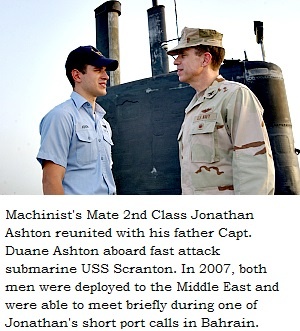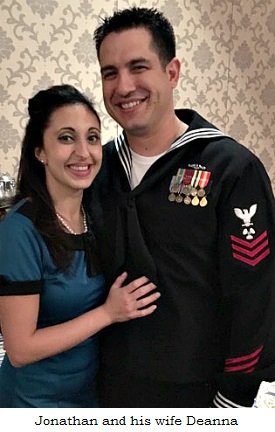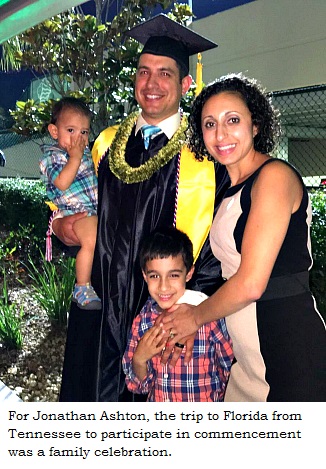Navy Nuke, Submariner And Saint Leo Grad
Jonathan Ashton completed the Navy's Nuclear Power School to serve his country. He completed a college degree to prove something vital to himself.

Jonathan Ashton completed the Navy's Nuclear Power School to serve his country. He completed a college degree to prove something vital to himself.


By the time Jonathan Ashton received his first orders as a Machinist's Mate 3rd Class aboard the attack submarine USS Scranton, he had completed what many consider the most academically challenging training program in the U.S. military and the most advanced nuclear physics training in the world – the Navy's prestigious Nuclear Power School.
It was a remarkable accomplishment for a young man who, although enrolled in the rigorous International Baccalaureate (IB) program in high school, admits his lack of focus prevented him from living up to his academic potential. He graduated from high school, but was not eligible to participate in his graduation ceremony—something he has always regretted.
"I missed being with my friends, seeing my parents smile and, more importantly, feeling proud of myself. I knew that I needed a drastic change in my life."
This spring the Navy nuke, submariner, husband, father of two, and online degree student in Saint Leo's business management program not only walked across the stage at commencement. He graduated with the highest honors possible: summa cum laude.
In addition, Jonathan was selected to represent his class as this year's Center for Online Learning commencement speaker.

Now nearing his fourteenth year of service with the Navy, Jonathan currently works as a placement coordinator at the Navy Personnel Command in Millington, Tenn. He serves as the nuclear community's command advocate overseeing 10,500 enlisted sailors and ensuring that the fleet is manned with the right personnel.
The shore assignment is well timed – a fit more conducive to raising a young family of two boys, ages 1 and 5, than sea duty.
The life of a submariner, he explains, is one of the most difficult military careers. For months at a time, submariners aboard Los Angeles or Virginia-Class submarines live in 33-foot-wide metal tubes hundreds of feet under water, cut off from the world. No space to move. No sun to indicate if it's day or night. No internet for email or social media. No phone lines to hear a loved one's voice. Food from cans. Bunks that resemble caskets.
"You have to be a little crazy to be a submariner," says Jonathan, "but submarining runs in my blood." Jonathan is the son of retired Navy Capt. Duane Ashton, a submariner, himself, with more than 30 years of service including command of the USS Columbia.
That family history made joining in the Navy while he was still in high school a natural step for Jonathan – a decision that was confirmed just nine days after he decided to enlist, when the Twin Towers fell and the Pentagon was attacked.
"My dad had just left the Pentagon to take command of a submarine in Hawaii," says Jonathan. "We were living in Virginia just outside of Washington D.C., and the majority of families in my high school were military. It was a scary time, but confirmed my decision to serve."
Submariners comprise a mere 6 percent of all Navy personnel, but represent some of the most highly skilled and knowledgeable sailors.

Eight weeks in Navy boot camp was Jonathan's first step toward becoming a nuke. Next was Nuclear "A" School to gain the skills needed as a machinist's mate, electrician's mate or electronics technician. Then he went on to Nuclear Power School to understand the operation, maintenance and supervision of a naval nuclear propulsion plant, before moving on to nuclear prototype training, where he learned how to apply that knowledge in a real operating nuclear propulsion plant.
Jonathan succeeded at a program that is so fast paced that recruits must learn four years of material in less than two. Calculus, chemistry, atomic and nuclear physics, thermodynamics and heat transfer, radiation protection technology, and more.
And while it's difficult for every sailor, Jonathan says he found the training particularly challenging.
"I still didn't know how to study," he says. "I almost didn't make it. It was very frustrating."
Perseverance and intelligence, however, won out. Upon completing the nuclear prototype training, Jonathan received his first formal recognition, the Plant Manager's Award for Excellence at the MARF prototype, which encouraged him significantly.
Jonathan's nine years as a submariner included two deployments on the USS Scranton, including one underway period that lasted 93 days. Five years as part of the pre-commissioning unit for the Navy's newest submarine at the time, the USS California, followed including, bringing the reactor critical for the first time.
Jonathan reached a turning point in his career during his second deployment aboard the USS Scranton. He decided he wanted to apply to the Navy's officer program – and that meant it was time to restart his formal education and earn a college degree.

Because he was able to gain a significant number of college credits from his nuclear power training, Jonathan quickly completed an associate degree program in applied marine engineering and nuclear engineering technology at a local community college. He then started an online degree program with Saint Leo, but was quickly overwhelmed with 16-hour days during his pre-commissioning work on the USS California and placed college on hold.
House-hunting two years later to start his current assignment in Tennessee, he received a call from his former student advisor at Saint Leo asking him if he was ready to restart his program.
"I was so impressed that he called me," says Jonathan. "That personal touch is what drew me back to Saint Leo and kept me there. My experience was very personal. Staff were always reaching out to me to remind me to register and to help keep me focused."
Jonathan says he also appreciated Saint Leo's eight-week terms. While difficult, shorter terms fit his learning style better and enabled him to reach his goal more quickly. With a strong commitment to his Christian faith, he also appreciated the religion course requirement.
"The biggest blessing, however, was the university's core values and how they were integrated into everything that we did, every assignment and paper. Saint Leo's core values are similar to the Navy's – Honor, Courage, Commitment – so they all tied together for me."
Jonathan says that earning a college degree is far more than a credential or a checkmark his on life's to-do list.
"This was a chance to finish perhaps one of the most important chapters in my book of life," he says. "Ever since I joined the Navy, I had this weight on my shoulders. I wanted to make my family proud by earning a college degree. But even more importantly, I wanted to prove to myself that I could do it."
That weight on Jonathan's shoulders lifted, replaced now by a few emotional tears of joy, as the tough Navy submariner and nuke now also calls himself a Saint Leo Lion and alumnus.
Image credits: Renee Gerstein-Saint Leo University Communications, U.S. Navy